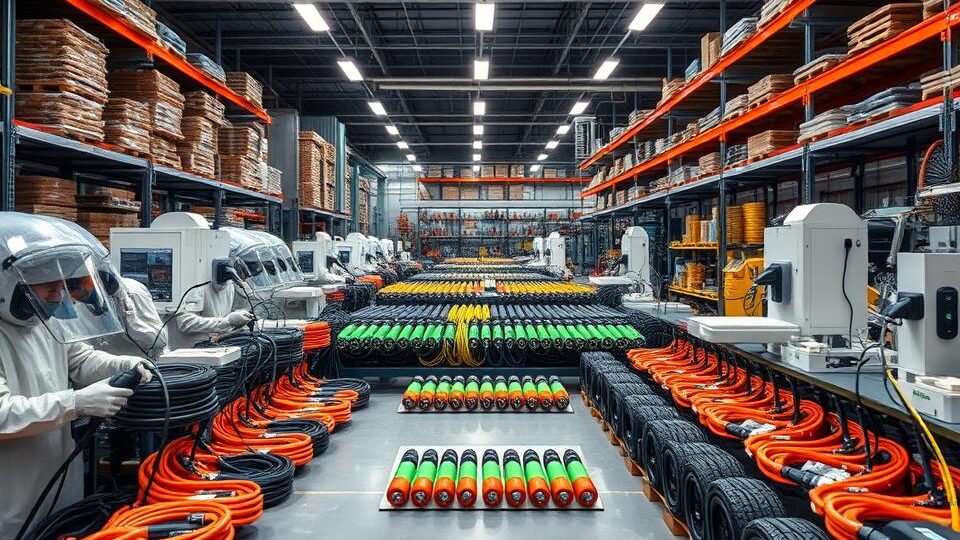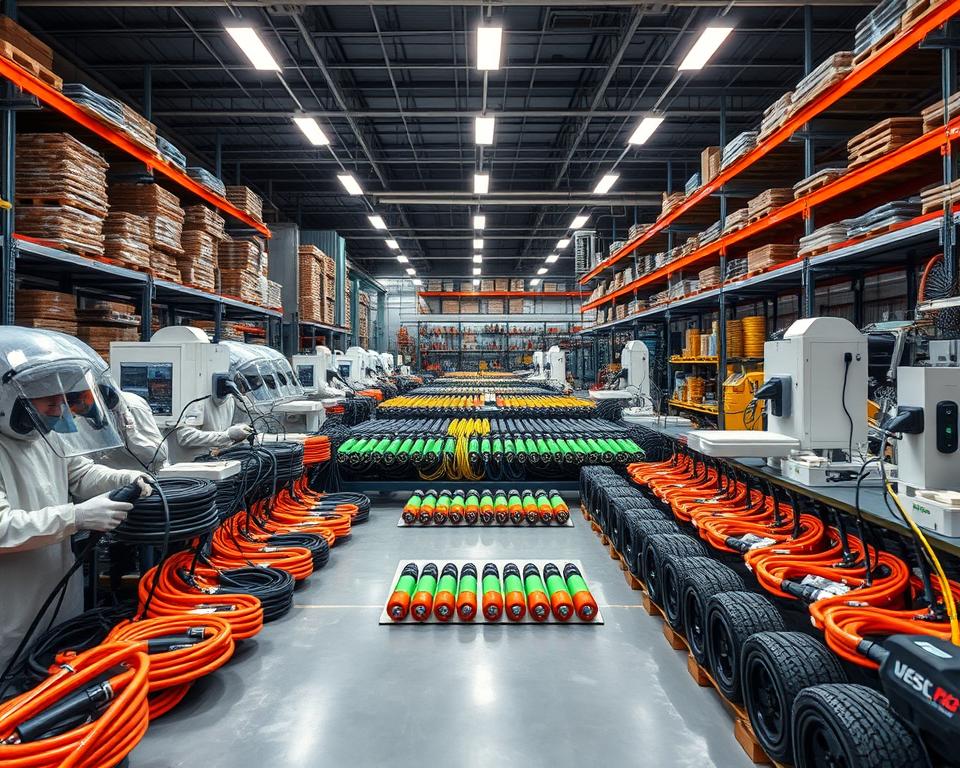
EV Charger Manufacturers Contributions to Smart Grid Development
Leading EV Charging Cable Manufacturers for Your EV
The electric vehicle industry is on the rise, with the demand for trustworthy and efficient charging solutions increasing sharply. Today, industry leaders have been at the vanguard of this change, providing high-quality charging infrastructure. Southwire, for instance, entered the market in 2014 and excels, boasting over 1000 five-star reviews and 75 years of experience in the electrical construction industry.
The rise in electric vehicle adoption necessitates the need for durable, quick, and secure EV Charger Manufacturers. Leading brands are innovating to address changing requirements, offering products that boost the overall charging experience.
Understanding the variations between various charging solutions is crucial for making informed decisions. High-grade charging infrastructure has a direct effect on vehicle performance and user experience.
Critical Findings
- Top manufacturers offer high-quality charging cables for improved durability and safety.
- EV market expansion drives need for high-efficiency chargers.
- Leading companies innovate to meet the evolving needs of electric vehicle owners.
- Premium cables enhance both charge rate and vehicle function.
- Investing in quality charging infrastructure is beneficial in the long run.

The Growing Importance of Quality EV Charging Cables
As more drivers choose EVs, the value of top-grade EV charging cables cannot be overstated. The performance, security, and reliability of electric vehicle charging systems depend heavily on the quality of the charging cables used.
How EV Charging Tech Has Advanced
Electric vehicle charging technology has undergone significant advancements in recent years, with a focus on faster charging speeds and enhanced protections. Modern EV charging cables are designed to meet these evolving needs, featuring high-grade materials and advanced designs to minimize energy waste and maximize charging efficiency.
Why Quality Matters in EV Charging Infrastructure
High-grade cables ensure reliable, safe charging. Durable features, such as weather resistance and flexibility in extreme temperatures, ensure reliable operation across various environments. Additionally, regulatory compliance and adherence to industry guidelines are crucial in ensuring that cables meet rigorous safety requirements.
| Key Features | Benefits |
|---|---|
| Superior materials and construction | Reduced energy waste |
| Enhanced durability features | Weather resistance, flexibility in extreme temperatures |
| Regulatory compliance | Rigorous safety requirements met |
| Maintainability | Long-term value proposition, reduced waste |
Aichie Tech Electronics’ premium cables undergo rigorous testing at The Cable Lab. By opting for serviceable Portable EV Charger Manufacturer, repairable designs reduce lifetime costs, reducing waste and protecting the planet.
Premier Chinese EV Cable Suppliers
China is home to a growing number of EV charging cable manufacturers. These companies are crucial in supporting the expanding electric vehicle (EV) market, offering premium charging cables designed for different applications.
Wottz – Top EV Cable Maker from 2014
Wottz has been a leading cable manufacturer since 2014. They offer a range of cables that meet the specific requirements of EV charging systems, including Mode 1, 2, 3, and fast-charging Mode 4 DC Charging.
Aichie Tech Electronics – 75 Years in Electrical Solutions
Aichie Tech Electronics leverages 75 years of electrical expertise in its EV cables. Their products are built for residential and commercial applications.
Other Notable Manufacturers in the Market
Companies developing flexible, weather-resistant and high-performance cables are also notable. These include Type 1 & 2 connector experts, as well as companies developing cables with enhanced flexibility and resistance to environmental factors.
Understanding Different Types of EV Charging Cables
As electric vehicles become increasingly popular, understanding the various types of EV Charging Cable Manufacturers is crucial for optimal charging experiences. Knowing cable types ensures you pick the right charger. The variety in EV charging infrastructure necessitates a closer look at the different cable types available.
Comparing SAE J1772 and Mennekes Cables
Type1 and Type2 charging cables are two common standards used for EV charging. Type 1, also known as SAE J1772, is North American standard, while Type 2, or Mennekes, is the standard in Europe. The right cable matches your car and charger. Type 2 cables often handle greater power, making them suitable for faster charging.
AC Level2 vs DC Fast Charging
Level2 charging cables offer faster charging than Level1, using 240V AC power to deliver up to 19.2 kW of power. DC Fast Charging cables, on the other hand, enable quick top-ups by on-site AC→DC conversion, allowing for much faster charging times. These cables are key for highway charging, enabling drivers to recharge quickly.
Granny Chargers vs Tethered Units
Granny chargers plug into home outlets for emergency use. Tethered cables are fixed to charging stations, offering ease at the cost of portability. The choice comes down to flexibility vs convenience.
Cable length, power rating, and connector type matter most. For instance, portable charging cables range from basic Level1 emergency chargers to more robust Level2 solutions. Vehicle-to-load (V2L) cables let EVs act as mobile power banks.
- Flexible granny chargers and L2 units suit various needs.
- Tethered cables are permanently attached to charging stations, limiting flexibility but eliminating the need for personal cables.
- Lengths vary from 5 m to 50 m—choose wisely.
Essential EV Cable Characteristics
High-quality EV charging cables are distinguished by several key features that ensure reliable and safe charging. These features are vital to safe, efficient charging.
All-Weather Durability
Cables must withstand rain, sun, and cold. Manufacturers like Wottz and Southwire craft their cables from recyclable materials that adhere to ROHS compliance, ensuring they withstand various environmental conditions. Their serviceable design facilitates easy maintenance and promotes recycling.
User-Friendly Design
Cables need to flex yet remain tough. High-quality EV charging cables are built for easy handling without sacrificing strength. This flexibility is combined with rugged construction for lasting performance.
Regulatory Approvals
Safety certifications and compliance with international standards are non-negotiable for reputable EV charging cable manufacturers. They ensure their products meet or exceed standards such as IEC62196 for connectors and UL2594 in North America. Rigorous third-party testing evaluates electrical safety, mechanical durability, and environmental resistance.
| Certification | Description | Region |
|---|---|---|
| IEC62196 | Connector safety standards | International |
| UL2594 | Standard for electric vehicle supply equipment | North America |
| ROHS | Restriction of hazardous substances | International |
By focusing on these key features, manufacturers can provide EV charging cables that not only meet the highest quality and safety standards but also enhance the overall user experience.
Next-Gen Charging Cable Tech
New cable tech is transforming EV charging, with a focus on ultra-fast charging, reliable data transfer, and sustainable compounds.
Liquid-Cooled Charging Cables for Ultra-Fast Charging
Liquid-cooled charging cables are emerging as a key technology for ultra-fast charging, minimizing thermal throttling during high-power sessions.
Advanced Connector Tech
Hyperboloid contact points improve electrical connection, ensuring reliable and efficient data transfer during the charging process.
Green Charging Cable Designs
Companies focus on green materials, minimizing ecological footprint with RoHS-compliant, serviceable builds. For instance, companies like Aichie Tech Electronics and Wottz are adopting serviceable design philosophies and RoHS compliance to minimize waste and promote recycling.
Programs for cable recycling, non-toxic compounds, and TPU sheaths mark the eco shift.
Choosing the Perfect EV Cable
Selecting the proper cable ensures optimal performance. To make an informed decision, consider several key factors.
Compatibility with Your Electric Vehicle Model
Verify your car’s inlet and cable plug match. Your vehicle’s onboard charger capacity sets the upper limit for AC power.
Picking the Right Cable Length
Select a cord length based on parking and outlet location. A longer cable adds reach at the cost of extra weight.
Matching Power and Speed
Match your cable’s power handling to your vehicle’s capabilities. Standard Level 2 home charging operates at 7.2 kW, but some vehicles support up to 19.2 kW with appropriate electrical service.
Mind these points to pick a cable that fits your EV lifestyle.
Conclusion: Investing in Quality EV Charging Infrastructure
With EV growth unabated, premium cables are essential. Investing in premium EV charging cables from established manufacturers like Wottz and Aichie Tech Electronics ensures superior durability and lower lifetime costs. Their serviceable designs allow for component replacement, reducing waste and costs. This approach aligns with the core values of electric vehicle ownership by promoting sustainability.
Selecting top-grade infrastructure prepares you for next-gen charging.